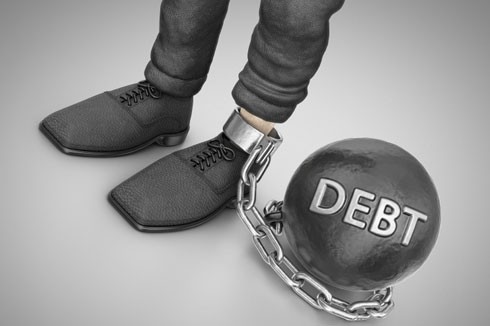
Considering it’s such a short word, ‘debt’ feels big and scary. None of us like other people to know we’re in debt. Many of us feel ashamed about being in debt. We don’t talk to our friends and family about our financial problems, and instead, we allow them to keep us awake at night when there’s nobody around to talk to. Our relationship with debt is unhealthy.
For this article, let’s start by taking some of the sting out of that word. Virtually everybody reading this article is in some kind of debt. If you’re in your bank account’s overdraft, you’re in debt. If you have a mortgage, you’re likely in tens of thousands of dollars worth of debt, if not more. Cars on a finance arrangement are a form of debt. Anybody who has a balance outstanding on a loan or credit card is in debt. Debt is everywhere, and almost everybody has it. Between all the citizens of the United States of America, over four trillion dollars of consumer debt is currently outstanding.
Debt only becomes a problem when it becomes uncontrolled, and there are many different ways that can happen. A period of unemployment can leave you behind with your debt payments, and create financial problems. Debts often accrue after a bereavement, as the partners and families of the deceased struggle to come to terms with their new financial situation. Sometimes, it’s just plain bad planning and poor decision making that allows debts to build up to unmanageable levels. No matter what the cause is, the most important thing is to deal with it. Hiding from the problem won’t make it go away. Instead, follow this process and start taking control of your personal finances.
Stop Borrowing
Once you can no longer manage your credit commitments, taking on further debt is a bad idea. You’ll just be robbing Peter to pay Paul. If your existing credit repayments already take up too much of your income, adding to the pile of debt isn’t the answer. You’re just adding to the problem, and trapping yourself in debt for a longer period of time. The only exception to this rule is if you’re able to find a debt consolidation loan that will pay off some of your existing debts, and reduce your monthly outgoings. Depending on how bad your debt situation is, this may already prove to impossible. Borrowing more money simply to pay your monthly obligations to other debts is a recipe for disaster. Instead, cut up your credit cards and commit to borrowing nothing further.
Communicate With Your Creditors
When you start missing payments to your creditors, you’ll start to receive letters chasing those payments. The longer you allow this to go on for, the more severe in tone those letters will become. You’ll be threatened with defaults, personal visits to your home, and possibly even legal action. This is the point where a lot of people bury their heads in the sand and make things worse in the process. What you actually need to do is reach out to them.
Unless you’ve told your creditors that you’re struggling, they have no idea why you’ve stopped paying. The communication you’re receiving is an attempt to push you into resuming your repayments. To them, you’re no different from a mobile slots game. They’ve put money into you, and they’re not getting anything back. What do you do when that happens in online slots? You spin again. Every letter or call you receive from them is another spin. Creditors are very committed mobile slots players. They’ll keep spinning until they get a result, or you give them a reason not to. Telling them you’re in trouble will change the tone of those letters. They may even be able to offer you a payment holiday, or a period of reduced payments to help you out.

Accept Your Credit Status Will Be Damaged
If you can’t afford to repay your creditors the full amount you owe to them each month, your credit status will be damaged. There’s no way around this, and so it’s important that you come to terms with it as quickly as possible. It’s unpleasant, but it’s not permanent. When you’re back on your feet again, your credit status will gradually begin to recover. In the meantime, it shouldn’t make much difference to your situation. All a bad credit status will do is make it harder for you to borrow money in the short term. As you don’t want to borrow any more money while you’re struggling, nothing is lost by this unless you work in a role where you’re not allowed to have bad credit. If this is the case, it’s even more important that you speak to your creditors and explain the situation.
Make Pro-Rata Offers Of Repayment
Creditors are legally obliged to consider reduced offers of repayment from you if you’re in financial difficulty. Ultimately, they cannot take money that you don’t have, and they’d rather get something than getting nothing at all. They will have processes in place which enable them to negotiate with you about your debt. If you treat them fairly, you should be able to agree upon a reduced payment plan.
The key to this is offering them a fair pro-rata repayment based on the amount of money you have available to pay toward your debts. Download an income and expenditure form from the internet, or write on up for yourself. Include all of your income, and total it up. Then add up all your essential expenditure. Essential expenditures include your mortgage or rent payments, utility bills, grocery shopping, insurance payments, and any other money you need to spend to go about your day to day life. Do not include any repayments you currently make toward your debts. When you’re done, deduct the expenditure figure from your income. The amount you have left over is your gross disposable income, and this is the total payment you should be splitting between all of your debt commitments.
In order to work out a pro-rata payment, there’s a formula you need to follow. First, add up the total amount of debt you owe between all of your creditors, and write this figure down. Then, one at a time, divide each individual debt by the total debt owed, and multiply that resultant figure by your amount of gross disposable income. That should be your offer of payment to that creditor.
As an example, let’s say you owe $45,000 in total, and one of those debts is a $2,000 credit card. After going through your income and expenditure, your gross disposable income is $280. To work out how much we should offer to your credit card company; first, we divide 2000 by 45000. That gives us a figure of 0.0444. We then multiply 0.444 by 280, and get a figure of 12.444. Your monthly repayment offer to that credit card should, therefore, be $12.44 of your $280 budget. Repeat this process for all of your debts, and then send the offers – along with your income and expenditure details – to the in the post, or by email. Begin making the payments as quickly as possible.
It’s important to note that your creditors are not obliged to accept your offers, but it’s unlikely that you’d be ordered to pay more than your fair pro-rata share in the event that legal action was to be taken, and so the majority should at least accept your offer in the short term. Remember that if you’re in serious debt and can’t see a way out of it, you should contact a debt service professional to assist you.
Categories: Debt
 Everything You Need to Know About Business Vehicle Leasing – and is it for You?
Everything You Need to Know About Business Vehicle Leasing – and is it for You?  Tips For Breaking The Renting Cycle
Tips For Breaking The Renting Cycle
Leave a Reply